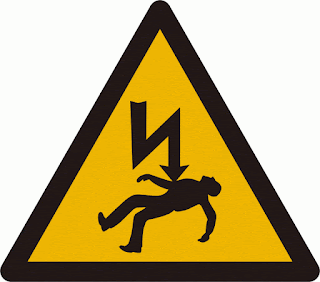Some people think that the first thing to do to a victim of electric shock is to start hitting the person with a big wooden stick, but that will only cause more injuries to the person. If someone’s been electrocuted and you happen to be there, do not touch him or her! The very first thing you must do is break contact between that person and the current; then you can administer first aid to them while you rush them to the hospital immediately. You can do this by either shutting off electricity at the mains or by using a non-conductive material such as a piece of wood or something made of plastic to push that person away from the current - not hitting the person!
If you don’t have an item made of wood or plastic to do the job, you can use a t-shirt, a leather belt or a pair of trousers. Do it like you would use a rope. Wrap the cloth or the belt around the body part that’s still connected to the source and move it away from it. Your skin and his should never be in close contact, even if there’s a layer of cotton between them.
At high enough voltages, electricity can travel through air. Stand close enough to the victim and you could quickly get into trouble if the current is strong enough.
FIRST AID FOR AN ELECTROCUTION VICTIM
After you’ve removed the electricity source, the right thing to do is to put them in the recovery position and perform chest compression fast and hard if they’re not breathing. Also, you probably don’t need to do mouth-to-mouth, just keep pumping. Mouth to mouth can also be risky as you never know what kind of disease that person has that he could pass on to you (particularly post-crisis scenario).
Don’t forget to treat any skin burns by applying cold water or ice. The problem is that some of these burns can be deep so applying cold water or ice is a top priority as long as they’re breathing and conscious. Oil or any other type of ointment will NOT do at this stage, it must be something cold to cool that person off.
Also, keep in mind that short-circuits present a real risk of fire. The moment you have time, you should check the perimeter for flames and immediately take action.



No comments:
Post a Comment